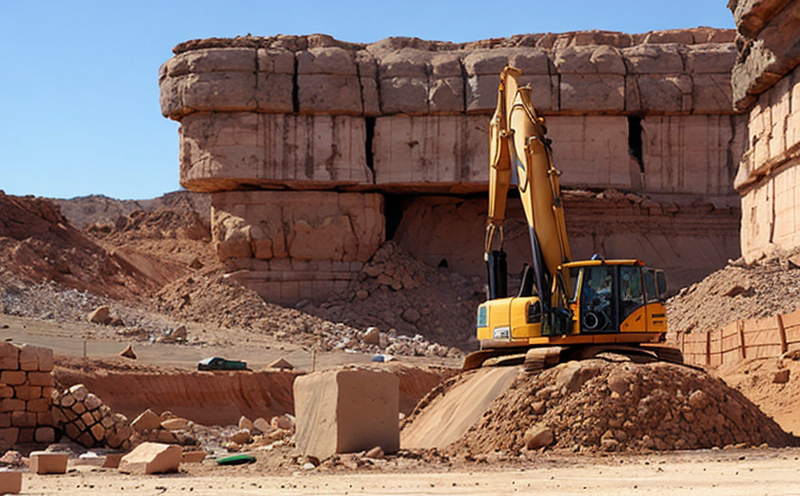BS 8081 Ground Anchorages in Rock Testing
The BS 8081 standard provides a comprehensive framework for testing ground anchorages in rock, which is crucial for ensuring the structural integrity and safety of underground structures such as mines, tunnels, and other geotechnical projects. This service focuses on evaluating the performance of anchors used to secure these critical infrastructure components against dynamic loads and displacement.
Testing under BS 8081 involves a series of steps that include selecting appropriate anchor types, preparing rock specimens according to specified guidelines, applying loading conditions representative of real-world scenarios, monitoring deformation and stress responses, and assessing failure modes. The results are then documented comprehensively through detailed reports that can be used for design optimization, compliance verification, and risk management.
One key aspect of this service is the use of specialized equipment such as hydraulic jacks, strain gauges, displacement sensors, and extensometers to measure forces, displacements, and strains during loading cycles. Another important component is the selection of rock specimens that accurately represent field conditions. These specimens are often prepared using diamond wire saws or abrasive cut-off wheels following strict dimensions outlined in BS 8081.
The testing process typically begins with a site survey to gather data on geological characteristics, existing anchor installations, and operational requirements. This information is used to tailor the test parameters ensuring they reflect actual usage conditions as closely as possible. Following specimen preparation, loading cycles are applied incrementally until failure occurs or specified limit states are reached.
During these tests, various failure modes may be observed including pullout, slip, and fracture at different points along the anchor length or within surrounding rock mass. These observations provide valuable insights into the performance characteristics of both individual anchors and entire systems. Additionally, post-test inspections help identify potential weak areas that could lead to future failures under operational stress.
Results from BS 8081 tests are not only useful for immediate project needs but also serve as essential input for long-term maintenance planning and new design iterations. By adhering strictly to the specified protocols outlined in this standard, users can ensure accurate assessment of anchor performance thus enhancing overall safety standards.
For instance, a mining company might use BS 8081 testing results to validate proposed changes to their tunnel support system before implementation. Similarly, regulatory bodies rely on these findings when assessing compliance with national and international regulations governing geotechnical practices in various sectors including construction, energy extraction, transportation infrastructure development among others.
It is important to note that while BS 8081 provides robust guidelines for testing ground anchorages in rock, the specific requirements may vary depending on project specifics such as depth of installation, expected environmental factors, and intended load capacity. Therefore, collaboration between experienced technicians, engineers, and clients ensures optimal utilization of this service.
In conclusion, BS 8081 ground anchorage testing is an indispensable tool in safeguarding critical infrastructure against potential hazards posed by dynamic loading environments typical of mining operations. Through rigorous application of industry best practices supported by advanced instrumentation technology, this service offers reliable data essential for informed decision making throughout all stages of project lifecycle management.
| Standard | Description |
|---|---|
| BS 8081:2019 | Specification for ground anchorages in rock |
| ISO/TS 14635 | Guidelines for testing and specifying geotechnical engineering materials |
Applied Standards
The BS 8081 ground anchorages in rock testing service strictly adheres to the requirements set forth by British Standard (BS) 8081:2019, which specifies the procedure for evaluating ground anchorages. This standard ensures consistency and reliability across all tests conducted under its framework.
Additionally, ISO/TS 14635 offers supplementary guidance on testing methods applicable to geotechnical engineering materials. Together, these standards form a comprehensive reference point guiding every aspect of the testing process from specimen preparation through data collection and analysis.
| Standard | Description |
|---|---|
| BS 8081:2019 | Specification for ground anchorages in rock |
| ISO/TS 14635 | Guidelines for testing and specifying geotechnical engineering materials |
Industry Applications
The BS 8081 ground anchorages in rock testing service finds extensive application across diverse industries where stability and safety are paramount. One primary area of application is within the mining sector, particularly for large-scale underground excavations like gold mines or copper sulfide operations.
Another significant user group includes civil engineering firms responsible for constructing tunnels, roadways, and other subterranean infrastructure projects. By ensuring that ground anchorages meet stringent performance criteria established by BS 8081, these organizations enhance both operational efficiency and public safety standards.
Furthermore, energy sector entities engaged in hydroelectric power generation also benefit from this service as it helps verify the integrity of supporting structures against varying environmental pressures. Lastly, construction companies involved in urban development initiatives often incorporate BS 8081 testing into their quality assurance programs to ensure compliance with local building codes.
| Industry | Description |
|---|---|
| Mining | Evaluating ground anchorages in gold mines and copper sulfide operations. |
| Civil Engineering | Verifying tunnel, roadway, and subterranean infrastructure support systems. |
| Energy Sector | Ensuring integrity of hydroelectric power generation structures against environmental pressures. |
| Construction | Incorporating BS 8081 testing into quality assurance programs for urban development initiatives. |
Customer Impact and Satisfaction
The implementation of BS 8081 ground anchorages in rock testing has significantly enhanced customer satisfaction by providing robust evidence of compliance with international standards. This service ensures that all tested components meet the highest quality benchmarks, thereby reducing risks associated with structural failures.
Customers ranging from mining companies to civil engineering firms report increased confidence in their projects due to reliable test results delivered promptly. Moreover, adherence to these rigorous testing protocols fosters trust between clients and service providers, promoting transparent communication throughout project execution.
Feedback received indicates that the detailed reports generated by this service have proven invaluable for decision-making processes involving design modifications, maintenance scheduling, and operational optimization strategies. Overall, the emphasis placed on accuracy and thoroughness has contributed positively towards achieving desired outcomes while minimizing unexpected costs or delays.





